Related Research Articles
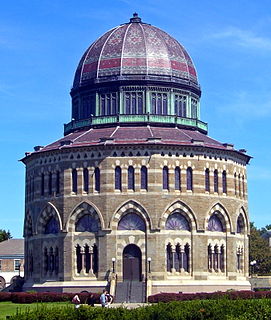
Schenectady is a city in Schenectady County, New York, United States, of which it is the county seat. As of the 2020 census, the city's population of 67,047 made it the state's ninth-largest city by population. The city is in eastern New York, near the confluence of the Mohawk and Hudson rivers. It is in the same metropolitan area as the state capital, Albany, which is about 15 miles (24 km) southeast.

Cold Spring is a village in the town of Philipstown in Putnam County, New York, United States. The population was 1,986 at the 2020 census. It borders the smaller village of Nelsonville and the hamlet of Garrison. The central area of the village is on the National Register of Historic Places as the Cold Spring Historic District due to its many well-preserved 19th-century buildings, constructed to accommodate workers at the nearby West Point Foundry. The town is the birthplace of General Gouverneur K. Warren, who was an important figure in the Union Army during the Civil War. The village, located in the Hudson Highlands, sits at the deepest point of the Hudson River, directly across from West Point. Cold Spring serves as a weekend getaway for many residents of New York City.

Peter Seeger was an American folk singer and social activist. A fixture on nationwide radio in the 1940s, Seeger also had a string of hit records during the early 1950s as a member of the Weavers, notably their recording of Lead Belly's "Goodnight, Irene", which topped the charts for 13 weeks in 1950. Members of the Weavers were blacklisted during the McCarthy Era. In the 1960s, Seeger re-emerged on the public scene as a prominent singer of protest music in support of international disarmament, civil rights, counterculture, workers' rights, and environmental causes.

The Capital District, also known as the Capital Region, is the metropolitan area surrounding Albany, the capital of the U.S. state of New York. The Capital District was first settled by the Dutch in the early 17th century and came under English control in 1664. Albany has been the permanent capital of the state of New York since 1797. The Capital District is notable for many historical events that predate the independence of the United States, including the Albany Plan of Union and the Battles of Saratoga.
The Peekskill riots took place at Cortlandt Manor, Westchester County, New York, in 1949. The catalyst for the rioting was an announced concert by black singer Paul Robeson, who was well known for his strong pro-trade union stance, civil rights activism, communist affiliations, and anti-colonialism. The concert, organized as a benefit for the Civil Rights Congress, was scheduled to take place on August 27 in Lakeland Acres, just north of Peekskill.
Flying Fish Records was a record label founded in Chicago in 1974 that specialized in folk, blues, and country music. In the 1990s the label was sold to Rounder Records.
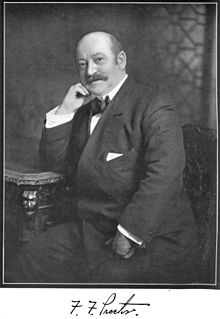
Frederick Freeman Proctor, aka F. F. Proctor, was a vaudeville impresario who pioneered the method of continuous vaudeville. He opened the Twenty-third Street Theatre in New York City.

The Hudson River Sloop Clearwater, Inc. is a non-profit organization based in Beacon, New York that seeks to protect the Hudson River and surrounding wetlands and waterways through advocacy and public education. Founded by folk singer Pete Seeger with his wife Toshi Seeger in 1966, the organization is known for its sailing vessel, the sloop Clearwater, and for its annual music and environmental festival, the Great Hudson River Revival.

The Clearwater Festival is a music and environmental summer festival and America's oldest and largest annual festival of its kind. This unique event has hosted over 15,000 people on a weekend in June for more than three decades. All proceeds benefit Hudson River Sloop Clearwater, Inc., a 501(c)(3) nonprofit environmental organization.
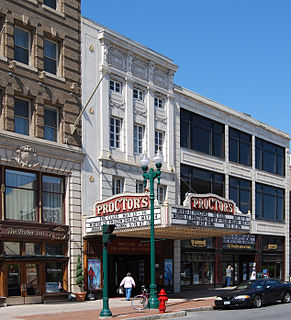
Proctor's Theatre is a theatre and former vaudeville house located in Schenectady, New York, United States. Many famous artists have performed there, notably Mariah Carey, Britney Spears, Hal Holbrook, Ted Wiles, and George Burns, as well as many others. It has one of the largest movie screens in the Northeast.

John Paul "Bucky" Pizzarelli was an American jazz guitarist.
Thomasina Winslow is an American blues musician from the Albany, New York area, and the daughter of folk musician Tom Winslow. As a toddler, she sang back-up on her father's folk music classic Hey Looka Yonder ; also singing a solo version of One-Two-Three, another version of which she produced on her own 30 years later. In addition to her solo career, Winslow has been a member of four bands, including a duo with Nick Katzman. Furthermore, she has been a teacher in that genre of music, and has significantly influenced other aspiring musicians. Winslow primarily performs covers of Blues standards and has written a number of blues and gospel tunes in her own right. She is also one of a handful of African-American women producers in the "indy" music industry today.

Thomas Griffin Winslow was a prominent American folk singer and writer, best known as a "disciple" of Reverend Gary Davis and a former member of Pete Seeger's band. He performed with his family as The Winslows and recorded with Al Polito. His career as a performing artist lasted over forty years. He was most notable as the composer of "Hey Looka Yonder ", a folk song that has been the anthem of the Sloop Clearwater.

Emma C. Berry is a fishing sloop located at the Mystic Seaport Museum in Mystic, Connecticut, United States, and one of the oldest surviving commercial vessels in America. She is the last known surviving American well smack. This type of boat is also termed a sloop smack or Noank smack. The Noank design was imitated in other regions of the United States.
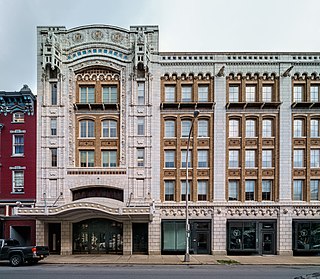
Proctor's Theater is located on Fourth Street in Troy, New York, United States. It was listed on the National Register of Historic Places in 1979, and is a contributing property to the Central Troy Historic District, added to the Register in 1986.
Toshi Seeger was an American filmmaker, producer and environmental activist. A filmmaker who specialized in the subject of folk music, Toshi's credits include the 1966 film Afro-American Work Songs in a Texas Prison and the Emmy Award-winning documentary Pete Seeger: The Power of Song, released through PBS in 2007. In 1966, Seeger and her husband, folk-singer Pete Seeger, co-founded the Hudson River Sloop Clearwater, which seeks to protect the Hudson River and surrounding wetlands. Additionally, they co-founded the Clearwater Festival, a major music festival held annually at Croton Point Park in Westchester County, New York.
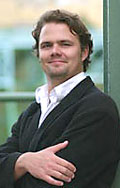
Thomas Rosenkranz is a contemporary American pianist, noted for performances of modern and international music.

Culture in New York's Capital District, also known as the Albany metropolitan area, stretches back to the 17th century. The area has seen prominent historical events, interesting artistic creations, and unique contributions to the culture of the United States. The largest city in the area, Albany, consistently ranks high on lists of top cities/metro areas for culture, such as being 23rd in the book Cities Ranked & Rated. The Albany-Schenectady-Troy metro area ranked 12th among large metro areas, and Glens Falls ranked 12th among the small metro areas, in Sperling's Best Places, and Expansion Management gave the Albany-Schenectady-Troy area five Stars, its highest ranking, for quality of life features.

Downtown Schenectady is the central business district for the city of Schenectady, New York. It originated in the 1820s with the moving of the commercial and industrial interests east from the original 17th and 18th century settlement, spurred on by the development of the Erie Canal. Home to the headquarters and major manufacturing plants of two large corporations, General Electric and American Locomotive Company, Downtown Schenectady catered to tens of thousands of workers in its heyday. Typical of the post-industrial Northeastern United States and Upstate New York in particular, Downtown Schenectady saw a decline in manufacturing and population starting in the 1970s. Recent construction and renovation has caused the downtown area to become an entertainment mecca for New York's Capital District anchored by Proctor's Theatre.

Between 1947 and 1977, General Electric polluted the Hudson River by discharging polychlorinated biphenyls (PCBs) causing a range of harmful effects to wildlife and people who eat fish from the river. Other kinds of pollution, including mercury contamination and cities discharging untreated sewage, have also caused problems in the river.
References
- ↑ "Welcome". Archived from the original on 2012-03-25. Retrieved 2012-10-31.
- ↑ "Altamont Enterprise (2008)" (PDF). Archived from the original (PDF) on 2011-07-26. Retrieved 2010-09-03.
- ↑ "Property". Archived from the original on 2011-07-26. Retrieved 2012-10-31.